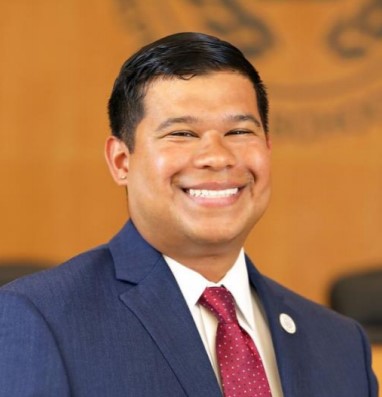James Hernandez: Candidate Bio and Personal Statement

You are here
Biography

James Hernandez received his undergraduate degree in Psychology with a focus on research and counseling from Our Lady of the Lake University in his hometown of San Antonio, Texas. As a McNair Scholar, James completed an original research project and subsequently disseminated his research throughout Texas and the United States.
After graduating from OLLU, James entered the workforce as a lifeguard supervisor, then as a PreK for San Antonio (PK4SA) teaching assistant. After a year of full-time work, James decided to pursue graduate education at the University of Utah in Salt Lake City, Utah where he received a master’s degree in education, culture and society. One notable accomplishment while at the University of Utah was the invitation for James to be the convocation speaker for the School of Education 2017 graduating class.
After graduating from the University of Utah, James pursued a career in direct care watching over youth diagnosed with behavioral and emotional disorders at a local non-profit in San Antonio. Subsequently, James worked as a case manager for victims of sex trafficking at another non-profit before finally deciding to pursue his doctoral degree in Interdisciplinary Learning and Teaching with an emphasis on early childhood/elementary education at the University of Texas at San Antonio where his research focuses on technology-enhanced learning in early childhood education. Currently, James serves on his local school board and mentors a young man through a local non-profit organization called the THRU project.
Personal Statement
I grew up in San Antonio and attended Edgewood ISD, one of the most impoverished school districts in the area. I obtained an undergraduate degree from Our Lady of the Lake University in Psychology and a Master’s degree from the University of Utah in Education, Culture, and Society. Upon returning from Utah, I worked as a direct care supervisor for the Children’s Shelter of San Antonio and a case manager for victims of sex trafficking before applying for admission to a doctoral program. Currently, I am working on a Ph.D. in Interdisciplinary Learning and Teaching at the University of Texas at San Antonio with a focus on Early Childhood/Elementary Education. I am pursuing a degree in ECE because I intend to continue my academic and political work to strengthen the public’s understanding of the importance of ECE and its impact on our society. I am also serving on my local school district board. Through this experience I have learned about various aspects of board service, board efficiency (or lack of) and board governance. I am currently in the beginning of my 2nd year of a 4-year elected term.
One of the critical issues that I see facing early childhood education is the lack of diversity in the workforce. There is a great need for male teachers as well as teachers of color if we are to uphold the idea of equity and representation of children in the classroom. No longer is quality early childhood education a realm for only a particular gender, class, or racial background. I am a testament to this. As reflected in the recent NAEYC Advancing Equity in ECE Position Statement, the need for high quality teachers should not be based on a person’s skin color, sexuality, or gender, but rather on the strengths, knowledge, skills, and abilities of the candidates. However, issues of systemic racism, barriers to higher education, and general misunderstanding of the early childhood field, lead to many self-selecting out of the early childhood education field.
Second, funding is not at an adequate level because the development of young children is not fully understood by those that make policy. This, in turn, leads to many who do not consider early childhood education as a fundamental need for families and their children. In San Antonio, there has been an increased focus on early childhood education through the city’s PreK4SA program. The success of this program has led to various non-profit organizations also working toward increasing quality in ECE. This shift towards greater early childhood education has been in response to the poor outcomes of our middle and high school students. Unfortunately, the students that need these services the most are those that live in poverty and have endured pervasive discrimination. A renewed focus on equity within ECE leads to children and families receiving quality education regardless of their zip code.
Third, I want to support affiliates of NAEYC by pushing for a nationally recognized mentorship program. In my years as an undergraduate and graduate student, mentorship has been one of the most valuable and rewarding experiences of my career and I want as many NAEYC members to also experience this opportunity. Because mentorship is so broad and can look different in many situations, I believe that NAEYC should model what good mentorship dialogue looks like and create a framework for members in the beginning of their career to contact and network with members that are experts in the field of Early Childhood Education. This program will ensure growth and create opportunities for our recently graduated teachers and seasoned veterans that would like to share their knowledge and expertise with those willing to listen and learn of best practices in the field of Early Childhood Education. If possible, I would lobby for the NAEYC to provide complimentary membership for individuals that decide to take on a mentoring opportunity.
In conclusion, I bring much knowledge, skills, and abilities to the board. A mixture of personal experiences of privilege, discrimination, and education, heavily informs my knowledge of the world. I have a background in psychology, education, social work, and politics. To appreciate a complex political system like education, all of the aforementioned knowledge sets must be understood, at least at a basic level. My skills include understanding and interpreting data and information, public speaking, writing, and planning. In my role as a local school board member, I engage in discussion and debate with many different professionals, some with decades more experience than I have. To further strengthen my point, a single school board meeting may have topics regarding school finance, governance, student outcomes, and employee evaluations. I have developed a working knowledge of all of these topics and much more. I feel all of these skills contribute to NAEYC’s vision that ‘all children will thrive’.